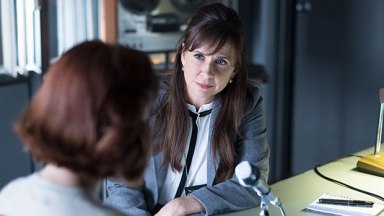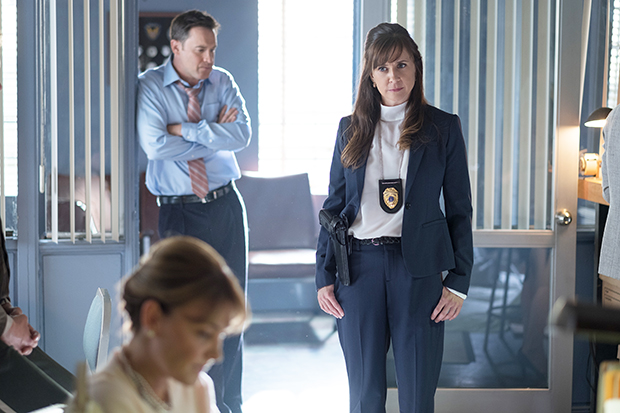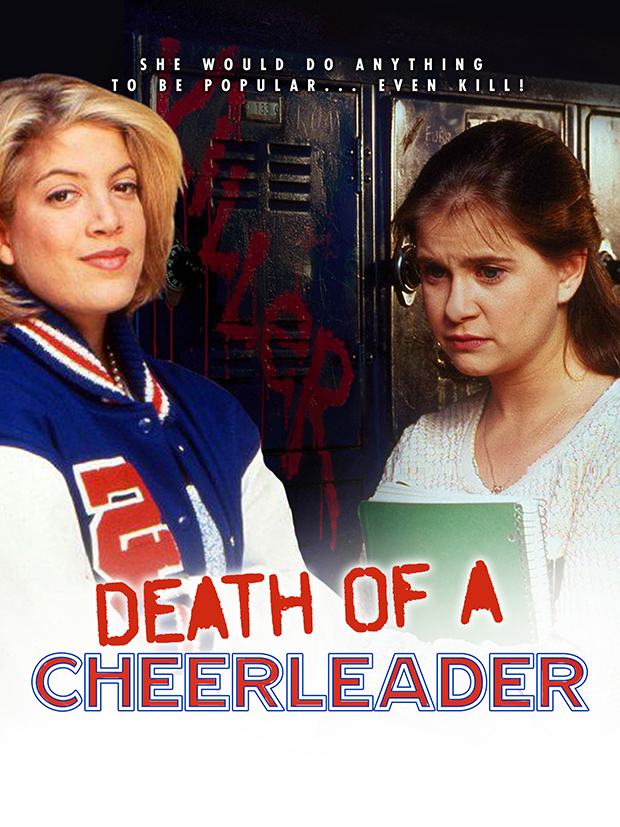
Lifetime is celebrating the 30th anniversary of the Lifetime Original Movie all summer long and will be starting off with the ultimate throwback movie weekend on May 30 and May 31, which will be hosted by Niecy Nash. New premieres will be paired with throwback titles. One of those throwback titles is the cult classic 1994 Lifetime movie Death of a Cheerleader, which starred Kellie Martin and Tori Spelling. The movie will air on May 30 at 11 a.m.
HollywoodLife talked with Kellie about filming the cult classic and returning for a special role in the 2019 remake. Kellie opened up about how the role of Angela in Death of a Cheerleader was her first role after playing Becca in the series Life Goes On, and she was determined to do the real-life story justice. Plus, she discussed how she ended up playing an FBI agent in the remake, a role that was originally written for a man. Read our Q&A below.
The 1994 version became a huge cult classic. How did that role change your life at the time?
Kellie Martin: I did Death of a Cheerleader right after a series I did called Life Goes On was finished. That was my first job after Life Goes On. It was, first of all, strange to play a different character than I had been playing for 4 years because I was Becca for so long. This was kind of my first opportunity in a long time to play a new character. I had a lot of empathy for the character I was playing, which is a strange thing to say, considering she killed someone. But what I wanted to do was really dig into who she was before this incident happened. Also, playing someone who exists is tricky. I really wanted to do the story justice and to do her path justice. I think I was excited to do the role because it was so dramatic. There was a lot of meat to it. There was a lot for me to do as an actor.
Looking back on the character, do you feel differently about Angela than you did back then or do you feel pretty much the same?
Kellie Martin: Well, that’s an interesting question. I think now it’s interesting to see what drives someone to that moment where they would do something like that, where they would kill someone else. I’m a mom now. My head as a mom is certainly different now. I think it’s interesting that the movie became a cult classic, and there’s an element of camp to the 1994 movie. I don’t know why that is. The newer version feels a little bit more like a documentary. It feels a bit more rooted in reality, and the 1994 one I feel like has an element of camp, an element that really feels like fiction. I guess I kind of have a different perspective now looking back, and especially since two versions of it have been made. Certainly, it’s a horrible thing that happened. I had a weird job of, in 1994, being the vessel to deliver this story to Lifetime viewers. It’s odd to play that role, actually, thinking back on it now.
The 2019 version premiered 25 years after the 1994 version. What was your reaction when you learned that Lifetime was remaking the movie?
Kellie Martin: I was not surprised because so many interesting and successful shows have been remade in the last few years. It made sense to me that Lifetime wanted to revisit it. When they asked me to be a part of it, I was certainly flattered. They offered me a couple of different roles, and I asked to see the FBI agent, which was written for a man, but I thought it would be fun for people who liked the ’94 version so much to have my character in the new version be the one that she confesses to. I wanted to have that moment. They offered me the part of two different mother roles, and I just thought, “How fun would it be to be the one who’s there at that moment when she confesses?” It was very much a full-circle moment. By the way, it’s the first time in my career that I said I want to play this role that’s written for a man. That’s never happened to me, so that was fun.
I feel like it’s fitting to have the FBI agent in the remake be a woman because this is very much a female-centric story.
Kellie Martin: I don’t know if it’s just the way it was written, but I like the way the scene turned out. The character I played drew it out of her in a very gentle way. So often, interrogation scenes are aggressive. I liked that the FBI agent decided to catch more flies with honey. She’s a kid. She’s not a hardened 16-year-old criminal. She’s a kid who did something horrible. But I like the way this character got at the crime the way she did.


Both versions explore the social hierarchy of high school and bullying and how young girls treat other girls. Why do you think the movie still resonates as much today as it did in 1994?
Kellie Martin: I think it’s just precisely what you said. High school girls haven’t really changed since back in 1994. I think that that dynamic is alive and well these days. Even if someone doesn’t mean to exclude someone, the person who’s excluded, their imagination just goes crazy as to why they could have been excluded. With social media and Instagram and all that stuff, someone’s self-worth is tied up in what others think of them. I mean, none of that has changed. That resonates completely today.
Do you have a specific moment during filming that still stands out to you or one that really challenged you?
Kellie Martin: I think the first scene we shot was the scene where I confess to the priest. I think that was the first thing we shot, which I can’t even believe I was able to do that. It was a monologue. That’s like the worst way to start any show is to do the confession before you establish the character at all. That was crazy. Figuring out the logistics of the knife when I stabbed Tori was really hard because it was a retractable knife, but it would sometimes stick a little bit so I didn’t stab her but sometimes it did hurt. I had to basically use full force but kind of stopped so I didn’t injure her. That logistically was really hard to do and make it look convincing. That scene was really, really hard to shoot. It felt so awful. I’d never done anything like that before. Shooting someone with a gun, maybe not at close range is not nearly as intimate as stabbing someone. To put your head there was pretty trippy.


